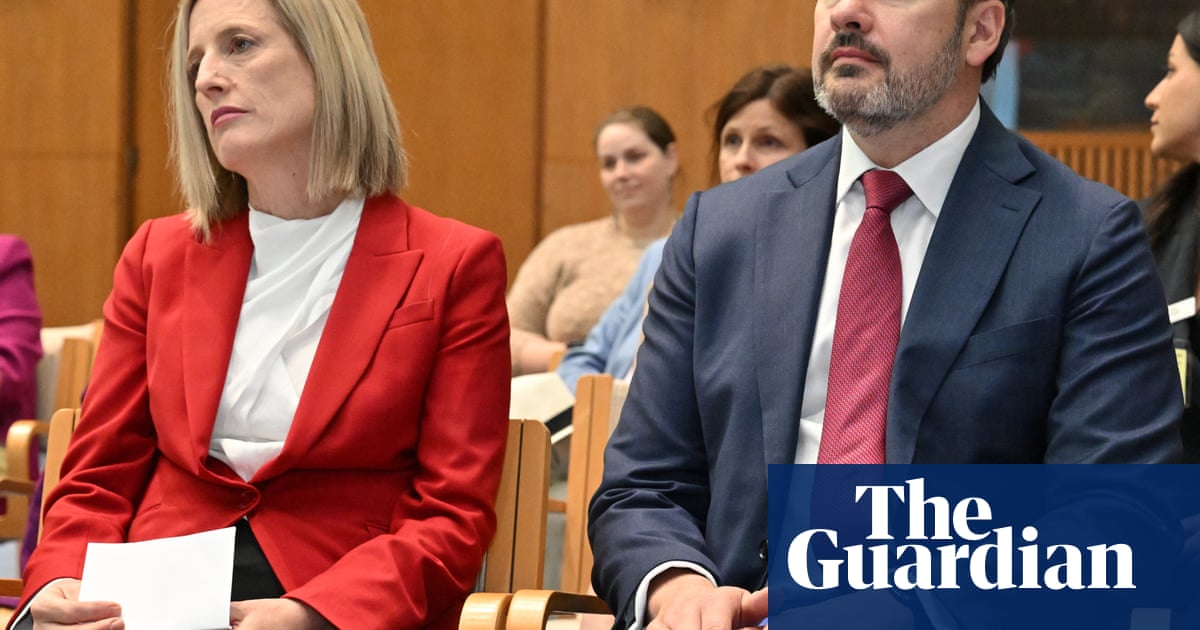A trade union leader was appointed to the board of the federal government’s $15bn National Reconstruction Fund despite not being shortlisted for the role or subjected to a formal “due diligence” check from private recruiters.
The circumstances surrounding the appointment of the Australian Manufacturing Workers’ Union (AMWU) national president, Glenn Thompson, to the board of Labor’s flagship fund was scrutinised in anew auditreport of the fund’s establishment.
The inaugural NRF board was announced inAugust 2023, with the chair, Martijn Wilder, and seven other members picked to oversee multimillion-dollar investments in projects across seven government priority areas.
Two months later, the then industry minister, Ed Husic, and the finance minister, Katy Gallagher, announced Thompson as the ninth board member following cabinet signoff.
In astatement announcing his appointmentfor a four-year term, the ministers said Thompson’s “passion for job creation complements the existing expertise of the NRF board, particularly in the areas of Australian manufacturing and industrial capability”.
He joined another union figure, the former Australian Workers Union boss Daniel Walton, onthe board, which also included the one-time Australia Post boss Ahmed Fahour and ex-federal Liberal minister Kelly O’Dwyer.
The Coalition criticised Thompson’s appointment at the time,accusing Labor of stacking the NRF with their union “mates”.
Sign up for Guardian Australia’s breaking news email
The Australian National Audit Office (ANAO) report revealed Thompson was installed in the $63,690-a-year role after the offices of Gallagher and Husic advised their respective departments on 6 October of their “wish to appoint a specified ninth member” to the board.
Separate documents released under freedom of information showedHusic approachedThompson, who is also a director of AustralianSuper.
The audit office revealed Thompson – who was not directly named in the report – was tapped despite not being shortlisted as part of an executive search process run by NGS Global, a recruitment agency chosen to find prospective board members.
The process proceeded at speed, with Thompson appointed on 16 October – less than a fortnight after Husic and Gallagher’s offices flagged it with their departments.
The audit revealed that in a brief prepared for Husic about Thompson’s board position, the industry department warned the appointment “may attract scrutiny” because of how the process was conducted.
It referenced corporate governance principles for ASX-listed companies, which recommended listed entities “undertake appropriate checks” before appointing a director.
In a similar brief prepared for Gallagher, the finance department conceded that no “formal due diligence” was conducted on Thompson’s appointment by a third-party because of “time constraints”.
The department did conduct a “desktop” check on Thompson after which it was satisfied his appointment “did not present a significant risk”.
Sign up toBreaking News Australia
Get the most important news as it breaks
after newsletter promotion
However, the in-house due diligence – which involved Google and media searches – was not documented and the industry department’s checks were “all verbal” due to the “compressed timeframes”.
The audit report did not rebuke the ministers, their offices or the departments over Thompson’s appointment, although it did identify record-keeping as an “opportunity for improvement”.
Husic was stripped of the industry portfolio after being dumped from cabinet following the election.
The portfolio now sits with Tim Ayres, a former state secretary of the AMWU – Thompson’s union.
In a statement to Guardian Australia, a government spokesperson said Thompson had 20 years of experience in senior leadership roles in the finance and manufacturing sectors, and extensive experience on boards, including in roles appointed under the Howard government.
“Appointments will be made through out the life of the corporation to suit the needs of the NRFC and their functions. A well-balanced board with the right expertise is vital to ensuring that the NRFC can successfully fulfil its investment mandate,” the spokesperson said.
The spokesperson did not directly address several of Guardian Australia’s specific questions, including about the timing of Thompson’s appointment, why a shortlisted candidate wasn’t chosen instead of him, and why more time wasn’t permitted to allow for formal due diligence checks.
Guardian Australia contacted the AMWU seeking comment from Thompson but did not receive a response.
Husic was unavailable for comment.
